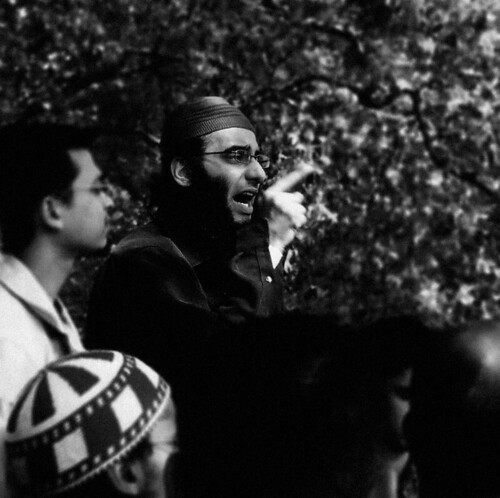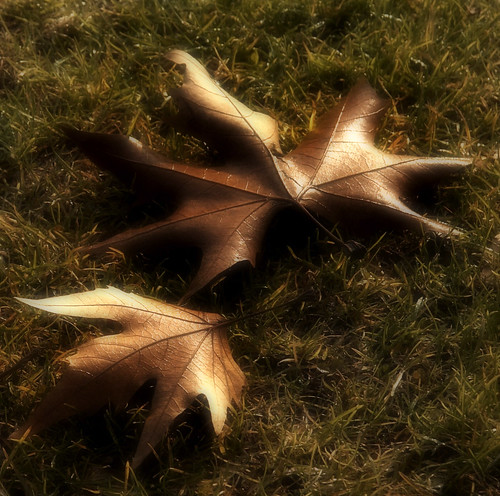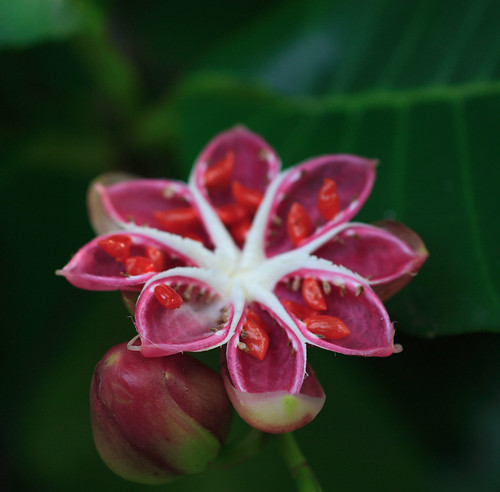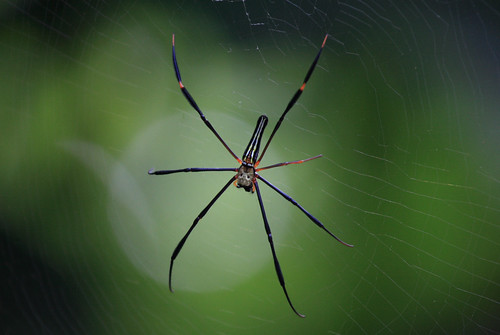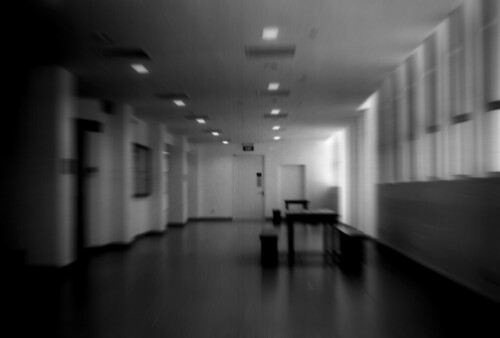Tuesday, January 30, 2007
Sunday, January 28, 2007
Thursday, January 25, 2007
Monday, January 22, 2007
Sunday, January 21, 2007
Bagh
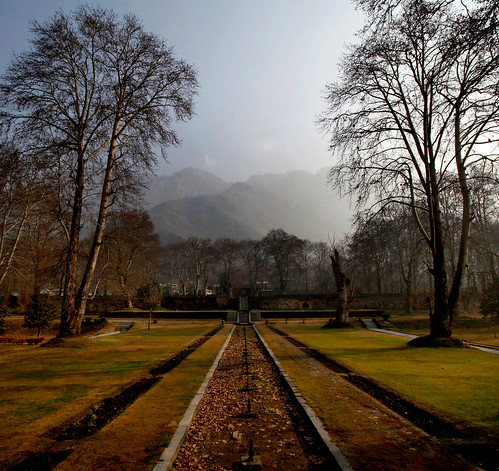
Everything is a Metaphor.
When I first arrived at the Nishat Gardens, I was almost sure that I was at the Shalimar Gardens. Rushdie's description of the Shalimar Gardens fitted the Nishat Gardens prefectly. Where I'm standing, the foot of the Himalayan mountain range rises to greet me and my back faces the shores of Lake Dal. I suppose he was using his entitled literary licence when describing the gardens. I also suppose that there is another view, the use of the Shalimar Gardens as a metaphor; for beauty created out of love.
Friday, January 19, 2007
Thursday, January 18, 2007
Spin
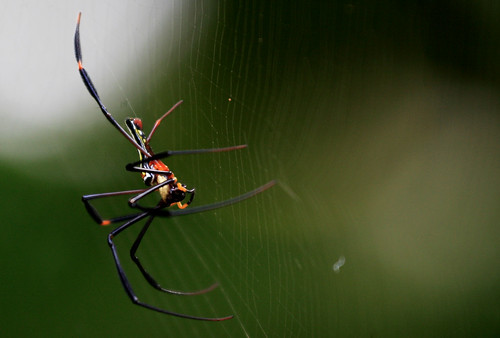
Spinning the web of deceit? But what's your spin?
Finally found the time to do a spot of bird-watching this morning. Been wanting to do that since I got back from Denmark but somehow never found the time to do so. Ambling through the nature reserve I found this brightly coloured spider trying to mend it's web, probably damaged from the recent rains. I've always thought that insects are superior in so many ways; industrious and emotionless. A reminder that intelligence isn't always enough.
Wednesday, January 17, 2007
Blending In

Don't shy away, blend in.
The colours of India never ceases to amaze me. I think I've shot the entire trip without a single B&W. And I do love black and white shots. After a long day of class, all I want to do is just fade into the background. Fade into oblivion. I was intending to post a tacky photo of the Taj Mahal but this photo better suits my mood.
Here are the photos from Agra and Delhi.
Tuesday, January 16, 2007
Flying Colours

Lets get away, Come on lets make a getaway. Lets fade together.
India is full of colour and Jaipur under the setting sun is truly a kaleidoscope of colours. I like visiting tourist attractions near closing time. Most of the tourist are gone and everything is quieting down. Only the locals are left, cleaning up or hanging around before heading home for their home cooked supper. Even the birds start to head home. The soft light entices you to linger around for just a little bit longer than you need to. Its only then that you get to truly soak up the atmosphere of a place, to breathe it in and to listen to its stories and histories told through the silence.
More photos from Jaipur here.
Monday, January 15, 2007
Kashmir
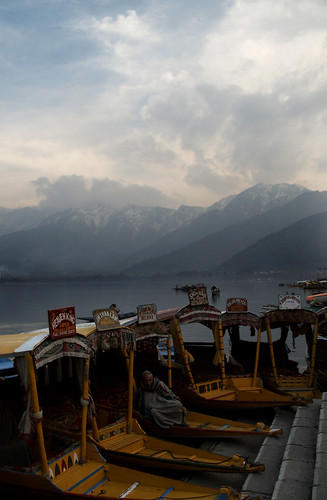
Rows of Shikaras lined up on the shores of Lake Dal, Kashmir.
An old shikara rower tries to stay warm as the sun sets and the mercury plummets, probably with the help of his Kangri. Ever so often, you hear the phrase "Kashmir is paradise" being mouthed off by the locals or one of these boatmen. And every time I hear it, I can't help feeling a sense of irony. Kashmir is paradise but not for those who truly call it home. But then again it all depends on your definition of paradise. Kashmir is indeed a beautiful place, where the himalayan mountain range, punctuated by dramatic valleys, meet silent still lakes. I only hope that the photos reflect its allure. Kashmir is paradise if you can ignore all the human activity. Maybe paradise was meant to be without man. I know this man is not worthy of paradise. Anyway, more photos here.
Sunday, January 14, 2007
On the Threshold
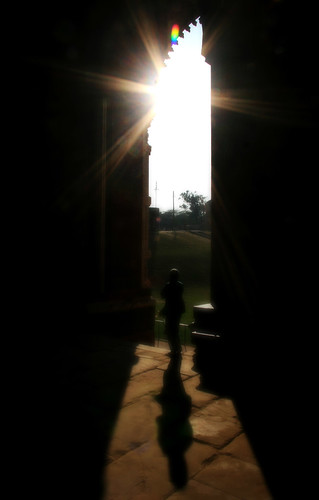
Sola Fides, Sola Scriptura?
Today's gospel was about the well known wedding at cana, where water was turned into wine. Listening to the gospel, I realised that the reason Catholics petition the Virgin Mary and the Saints to intercede for us can be seen in this gospel reading. At the wedding it was Mary, who sensing that the groom was in need of more wine, asked Jesus to help. Even though Jesus said that his time had not come, he duly preformed his first miracle, changing water into wine. Such is the grace of intercession. There is clearly a difference between petitions for intercession and worship. Worship is reserved only for the One who works the miracle. To me, this seems like a pretty literal reading, without much interpretation required. Sola scriptura? In this case, Indeed.
Saturday, January 13, 2007
Enough
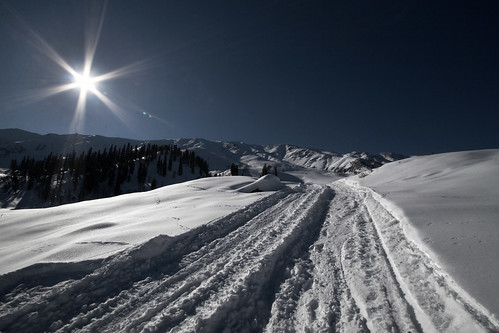
Blue skies and brilliant light at 12,000ft; Gulmarg, Kashmir.
Enough rain and clouds. I need my blue skies and sunshine. The current climatic condition is threatening to send me into depression. If this dreadful weather persists, I might actually buy one of those solar lamps that they use during the Scandinavian winters.
Thursday, January 11, 2007
Justoppose
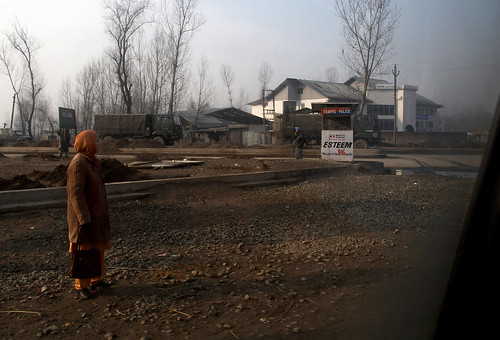
A woman watches, an outsider observes.
The lone Kashmiri woman watches as a convoy of Indian troops move towards the border with Pakistan. I like the voyeuristic view of this roadside standoff and the juxtaposition between the soft fabric wrapped woman and the steel encased soldiers. Not all standoffs have to be violent; a standoff of sentiments. Not all standoffs are equal. Kashmir for Kashmiris? Kashmir as an integral part of India? Kashmir with Pakistan under Islam? I wonder what is going through the woman's mind. Maybe she's miffed that her transport to work is held up in the jam caused by the convoy? Maybe she's silently cursing under her breath at the sight of the armed hindu/infidel occupiers? Maybe she's wondering what she will prepare for the family meal tonight?
Tuesday, January 09, 2007
Street Smart
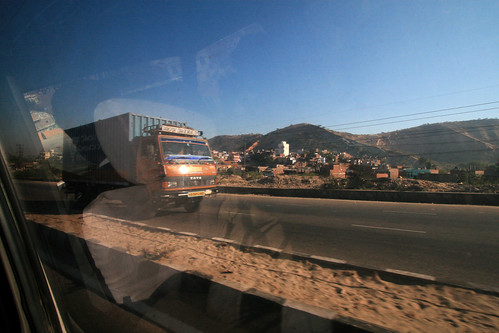
Jaipur to Delhi, 300Km, 5 hours, countless bumps.
When on the road in India, I noticed that most of the trucks on the road were local, i.e. registered in the state that we were travelling in. Its pretty easy to tell in India, all plates begin with 2 letters denoting the state. Just now, I chanced upon an article in FinanceAsia on India's insfrastructure deficit. In many Asian countries 7-8% of GDP is routinely earmarked for infrastructure creation. In China, 9% of GDP was spent in 2005 ($201 billion). In India, the number is about 3.5%. This explains why it takes 5 hours to cover 300km. Apart from hindering travel, the article reckons that the overall economic loss due to a lack of an efficient highway system is estimated at $4.5-$6.5billion a year. Infrastructure is the lifeline of an economy if the financial system is the heart. Its hard to imagine solid growth without proper infrastructure which is why I'm bearish on India despite the India China Bull run.
*300Km takes barely over 2 hours on the Autobahn
Monday, January 08, 2007
Sunday, January 07, 2007
Connected

Connected to the flow of life; drip by drip.
A night in the hospital hooked up to an IV machine is not the most ideal way of spending the last weekend of the holidays. Once again my ultra sensitive first world tummy has succumbed to the ravages of foreign food. Of course the whole thing was made worse by the soccer game on friday. I think my tummy has never recovered from the Cambodian incident 4 years ago, which also landed me in hospital. My gastro specialist has warned me sternly, like she did the last time, that I should avoid travelling to not so developed countries with a tummy like mine. But of course, like the previous time, the warning goes in one ear and out the other. Unfortunately, I'm an awful traveller. I have a highly sensitive(weak) tummy, can't sleep well on planes or cars or buses or trains and am highly allergic to dust which whips my sinuses into a frenzy. Yet at the end of the day, I think its all worth it. I'm still alive and enriched by my travels. There is so much in the world to see, so much to learn about others and more importantly about ourselves.
On a side note, there is a rather interesting article in the Sunday Times pg 25 titled "Why the population is not essential in wealth creation" by Victor Mallet. As you can see from my previous post, I am against large populations. I echo his views that governments should focus on per capita income growth that make more individuals better off rather than absolute economic growth. The article also talks about India and the "demographic dividend" that a large working force allegedly brings. I think its very well worth five minutes of your time.
Friday, January 05, 2007
Incredible India
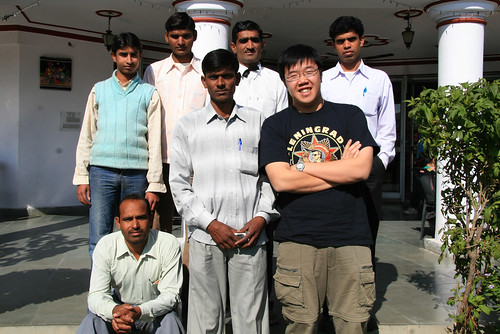
In India, Photo taking is a really serious affair. No smiles please.
This photo was taken at a rest stop en route from Jaipur to Delhi. Upon seeing my big camera, I was swarmed by request of photos and having received a token gift from my "adopted Indian brothers", I'm now under an obligation to mail them some photos. And then it struck me that most of them in spite being grown men, probably never had their photo taken before. How easily we take for granted the ability to freeze a moment of our past in a photograph. All of us probably have easily over 50 photographs of ourselves, ranging from our baby days to our big baby days. These people probably have none.
Of all the developing countries that I've visited, India seems to be the most worrying of the lot. Worrying in the sense that in spite of a lack of war, political instability, popular insurrectionist movements it still can't really seem to get its act together. Maybe this is due to the fact that it is the world's largest liberal democracy. Giving one man one vote is dangerous if the man is not educated to exercise his vote responsibly. Being a fervent believer in Plato's concept of a philosopher king has consequently resulted in me opposing full on democracy for developing countries.
I think India's biggest problem is its people. How do you change the mindsets of 1.1 billion people. Its times like this that I wished I had studied something more useful like developmental economics. Its also times like this when I can really imagine Thomas Malthus going "bugger me" at the sight of thousands of homeless families lining the streets. I was just musing to myself that in India, there is no need for streetlamps because once the sunsets the numerous homeless families that call the streets home light up biofuel fires for warmth, thus illuminating the streets. I suppose it can be a romantic notion to witness a street lighted by fire instead of electric lighting but look beyond the glow of the flames and you will see old and young caked in dirt and dressed in rags, malnourished and cold. The antithetical state of romanticism.
But polarity is what makes India unique. The bright contrast of sari shades, cold in the north-hot in the south, the super rich-the super poor, order and chaos-order in chaos, religous contrast-encompasing most religions of the world, the Caste system-differentiating a man from his brethren and so on. Such a rich divergence can be a positive spin for the nation, but ultimately it all boils down to the people problem. This is of course just my humble opinion. If only the woes of a nation could be solved by a blog post, we would all be living in Utopia.
Anyway, I think all Singaporeans should visit a developing country at least once. It is not enough to travel vicariously through the TV, one must experience the smell of poverty; a molotov cocktail of smells encompassing decomposition, fecal matter, dirt, smog and stagnant water that overwhelms your sense and strikes a chord deep within your humanity.
